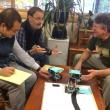Professor Berthold Horn of the Massachusetts Institute of Technology has selected the students of Midcoast Maine-based Gizmo Garden to assemble robots for his research into traffic flow. The project will yield pproximately $9,000 to support the engineering education programs of Gizmo Garden’s foundational partner, Skidompha Library in Damariscotta.
Pam Gormley, executive director of Skidompha Library, said “We’re honored that Professor Horn has chosen Midcoast Maine students for this assignment, and are grateful that donated materials for the robots will maximize the benefit to Skidompha. That money will support programs like next February’s Gizmo Water Park, for which we’re currently accepting applications.”
Professor Horn, of MIT’s Computer Science and Artificial Intelligence Laboratory, said, “I’m researching how to control congested traffic so that it flows smoothly with less starting and stopping. That will help humans to burn less fuel and will decrease injuries due to accidents.”
Bill Silver, technical director of Gizmo Garden, said: “Professor Horn is one of the world’s leading authorities in artificial intelligence and robotics. Our Gizmo Garden students have learned real-world electronic assembly skills, and it’s a privilege for us to be able to contribute those skills toward Horn’s research.”
Students who plan to participate in the robot assembly on Nov. 20 are Arden Carleton of Edgecomb, Finn Dworkin of Newcastle, Tanager Karchenes of Bath, Christian Longobardi of Westport Island, Nolen Michael of Newcastle, Lexi Moore of Phippsburg, Scott Petersen of Nobleboro, Benji Pugh of Alna, Brooke Rethman of Newcastle, Rachael Schuster of Jefferson, Heaven Wadford of Nobleboro, and Russell Webster of Wiscasset. They’ll be assisted by adult supporters of Gizmo Garden.
Professor Horn, whose work is funded by the Toyota Research Institute, said, “I’ve developed a computer model of how next-generation cruise control can smooth out traffic flow. My next step is to test that model using sensor-equipped, self-driving robots, and I need robots that aren’t available off-the-shelf.
“I noticed how the students in last year’s Gizmo Garden used self-driving robots to create a Gizmo Parade. To avoid collisions, they used forward-looking infrared sensors. If a gizmo was too far behind the preceding robot, it sped up. If a gizmo was too close to the preceding robot, it slowed down.
“Though I need robots with additions like backward-looking sensors and odometers, the Gizmo Garden students have learned the basic electronic assembly skills that will enable them to create what I need. I also like the well-organized Gizmo Garden microprocessor operating system, which will enable me to add my own software cleanly.
“Moreover, I noticed the 50/50 balance of girls and boys in Gizmo Garden programs. This aligns well with the diversity values of MIT.”
Bill Silver said, “This is a win-win-win-win. Professor Horn gets the robots he can’t find off-the-shelf. Gizmo Garden students get to put their electronic assembly skills to real-world use. Skidompha gets a financial benefit. And I get to play with robots.
“This honor inspires me as I flesh out plans for the Gizmo Water Park that we’ll create at Skidompha during this year’s February break. Parents of students can find out how to apply by the Dec. 7 deadline at gizmogarden.org.”



























